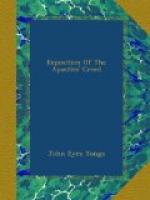According to the Romanists, Hades consists of three divisions—heaven, hell, and purgatory. Heaven is the most blessed abode reserved for three classes of persons:—1st, Those Old Testament saints whose spirits were detained in custody until Christ arose, when they were led out by Him in triumph; 2nd, Those who in this life attain to perfection in holiness; and 3rd, Those believers in Christ, who, having died in a state of imperfection, have made satisfaction for their sins and receive cleansing through endurance of the fires of purgatory. Hell is the abode of endless torment, where heretics and all who die in mortal sin suffer eternally. Purgatory is supposed to complete the atonement of Christ. His work delivers from original sin and eternal punishment, but satisfaction for actual transgression is not complete until after the endurance of temporal punishments and the pains of purgatory. The Church of Rome claims the right to prescribe the nature and extent of such punishments, and having devised a complicated system of indulgences, penances, and masses, professes to hold the Keys of Heaven and to possess authority to regulate penalties and obtain pardon for the living and the dead. Such claims are unfounded and false. God alone can forgive sin, and He recognises only two classes—the righteous and the wicked—here and hereafter; and only two everlasting dwelling-places—heaven and hell. The Romanist doctrine has no authority in Scripture, but is of heathen origin, being derived from the Egyptians through the Greeks and Romans, and having been current throughout the Roman Empire. Its effect has been the aggrandisement and enrichment of the papal priesthood and the subjection of the people. It contradicts the Word of God, which declares that there is no condemnation to the believer in Christ Jesus; that he hath eternal life; that for him to depart is to be with Christ, to enjoy unalloyed, unending blessedness. Protestants, therefore, hold that “the souls of believers are at their death made perfect in holiness, and do immediately pass into glory."[124]
Between those who hold the doctrine of purgatory and believers in universal restoration, there is not a little in common. Universalists reject the Atonement, and say that God always punishes men for their sins. The wicked must expect to suffer in the next world, but the mercy of God will follow them, the punishment endured will in time effect deliverance, and the result will finally be the restoration of all to purity and happiness. They thus maintain with regard to all, what Romanists hold respecting those who pass to purgatory, and both are to be answered in the same way. We cannot make satisfaction, and we need not, for Jesus has borne “our sins in his own body on the tree."[125] By this “one offering he hath perfected for ever them that are sanctified”; so that “there remaineth no more sacrifice for sins, but a certain fearful looking for of judgment and fiery indignation, which shall devour the adversaries."[126]




